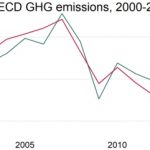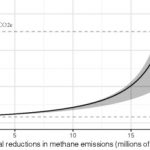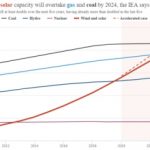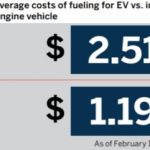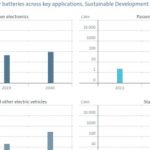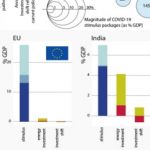Supply-side solutions to grid stability are few in number, and expensive. More baseload generation, electricity networks, capacity markets that pay power plants all year round to be available for dispatch during a few peak hours. Demand-side solutions are usually smaller, and multitudinous: building fabric improvements, equipment upgrades, customer behaviour interventions, and more. So, for grid stability, the principle of “Efficiency First” - … [Read more...]
We’re making much more progress decarbonising Electricity than Transport. Why?
In the OECD, since 2000, electricity sector emissions have fallen by 8% while transport emissions have actually increased by 5%. The best performers like the UK recorded drops in both: 40% and 6% respectively. In the U.S. it’s 25% and 0%. Catherine Wolfram at the Haas School of Business asks why transport is still going in the wrong direction, given the power sector’s progress. She posits three theories. Rich nations are outsourcing … [Read more...]
New net-zero pledges from China, US, EU and others can meet our climate goals, says UNEP. But…
Existing national commitments imply that today’s emissions will simply plateau, remaining only slightly below 2019 levels by 2030. However, according to the latest UN Environment Programme (UNEP) emissions gap report, the new commitments from China, the EU, Japan, South Korea, the UK, Joe Biden’s US and others are “broadly consistent” with the Paris Agreement’s 1.5C goal for 2050. But commitments aren’t policy, warns UNEP, and only real change … [Read more...]
The top Clean Energy developments of 2020
The world is still a long way off the pathway to meeting our emissions goals. But 2020 saw a number of major steps in the right direction. Laurie Stone at RMI presents a list of what has been achieved and which trends and new policy commitments are pointing us towards a much needed faster transition. They include coal’s decline, wind and solar’s growing competitiveness (even compared to gas), the promise of green hydrogen, bans on gas/petrol … [Read more...]
Satellite monitoring of Methane leaks makes policing them more effective
Satellites, drones, and airplanes should be used to detect methane leaks across the million active wells and hundreds of thousands of miles of pipelines across the U.S. That’s because without proper monitoring it’s extremely hard to find leaks, let alone regulate them. Meredith Fowlie at UC Berkeley’s Energy Institute at Haas describes their paper that uses such data to, first, show that 2.3% of upstream natural gas production is leaking. That’s … [Read more...]
Nuclear: Does the West’s military need Small Modular Reactors?
The development of small modular nuclear reactors (SMRs), generating up to 300MW, are already getting support for civilian purposes. The military in Russia, China and the U.S. are also interested. It should reduce the reliance on long fuel supply lines, the defence of which costs lives. SMRs would be factory made and delivered on site. But Lukas Trakimavičius says many difficult questions must be answered before the West commits to this solution. … [Read more...]
Biden’s Green New Deal: bipartisan support should clear a path for Nuclear
President-elect Joe Biden knows that a divided Congress and Senate will make passing most legislation very difficult, not least his sweeping decarbonisation agenda. However, there is one area where both Republicans and Democrats share the same goals, and that is nuclear power. Jennifer Gordon at the Atlantic Council explains why this can clear a path for nuclear while other elements of Biden’s clean energy programme may struggle and even fail. … [Read more...]
IEA’s “accelerated case” becoming the norm? Global Wind + Solar to overtake Gas and Coal by 2024
The IEA’s 2019 “accelerated case” for renewables is turning into this year’s “main case”. It predicts that Wind and Solar capacity combined will overtake both Gas and Coal globally by 2024. Josh Gabbatiss at Carbon Brief summarises the IEA’s Renewables 2020 report. Within five years, renewables will constitute 1/3 of all electricity generation, equivalent to the combined demand of China and the EU. Virtually all global growth in electricity … [Read more...]
The Road Transport Transition: a policy toolkit for electrification
For the electrification of road transport, planning, incentives, the removal of barriers, and the right regulatory framework are all needed. But different regions with different rural and urban lifestyles will each need their own solution. Camille Kadoch at RAP summarises their RAP EV Roadmap for the U.S. which provides a toolkit for assembling your unique solution. It includes targets, funding sources, policy coordination, incentives (including … [Read more...]
Rural America needs investment, jobs. $82bn/yr of Wind and Solar can deliver it
The build out of wind and solar in the U.S. – to rise from 165GW today to over 500GW in 2035 – will overwhelmingly happen in the open spaces of rural America, explains Kevin Brehm at RMI. It should result in a major boost to stagnating communities. The $82bn/year of clean energy investment will take second spot to the current three big rural spends: highways ($90bn), water utilities ($57bn) and mass transit ($45bn). By 2030 rural clean energy … [Read more...]
Battery innovation must drive the 50-fold increase in storage capacity needed by 2040
The IEA has set the storage sector a challenge. It says the world will need 10,000 GW-hours of batteries and other forms of energy storage by 2040, a 50-fold increase on today. The good news is that a joint study by the European Patent Office and the IEA reveals electricity storage patenting activity has grown 14% a year over the past decade. Here the IEA summarises the findings of its comprehensive report. It explains that Japan and Korea lead, … [Read more...]
The energy transition needs some of the $12tn global Covid stimulus. But much less than you think
Governments worldwide have committed over $12tn to recover from the Covid-19 pandemic, spent over the next 5 years. Current estimates say the energy transition needs $1.4tn/year globally between 2020 and 2024 to get us on the path to meet the 1.5oC Paris goal. Clearly, there is an opportunity here. Although support for healthcare systems and the overall economy are the stated priority of governments, much of that $12tn is still not committed. … [Read more...]
U.S. Nuclear: change the laws that constrain foreign and domestic investment
Today, Russia and China dominate global nuclear exports and new additions while the U.S. experiences budget overruns and cancellations. Once at the forefront, the U.S. should regain its leadership of nuclear power, argue Matt Bowen, Jennifer Gordon and Jackie Kempfer at the Atlantic Council. To recover its position it first needs to change the laws and policies that constrain its ability to cooperate with allies on nuclear matters, invest in … [Read more...]
Why promote Rooftop Solar when the Grid is so much cheaper?
Is rooftop solar in the U.S. getting more support than it deserves? One main argument from its advocates is that it will cut grid transmission and distribution costs that total hundreds of millions. Severin Borenstein at the Energy Institute at Haas crunches some numbers to try to uncover the true “avoided costs”. He shows that any savings won’t come even close to making up for the higher cost of rooftop electricity. It’s no match for the grid’s … [Read more...]
Renewables shares outperformed fossil fuels over 10 years. Have investors noticed?
Shares in listed renewables firms are outperforming their fossil fuel equivalents, both in terms of returns and volatility. But although investment is rising, they’re still not getting enough to meet our 2050 targets, says the IEA. Why? In this article summarising the first of a series of reports they look at the 5 and 10 year record of the two verticals. In all the three territories analysed – the U.S., the U.K., and Germany/France - renewables … [Read more...]
- « Previous Page
- 1
- …
- 11
- 12
- 13
- 14
- 15
- …
- 18
- Next Page »



